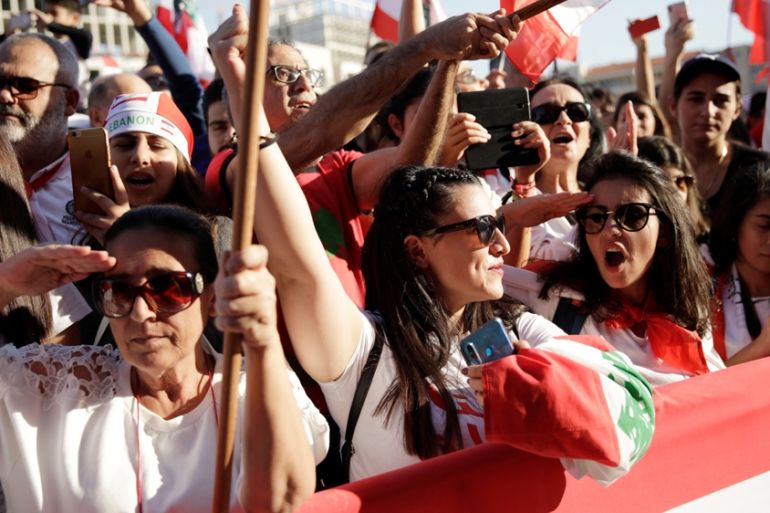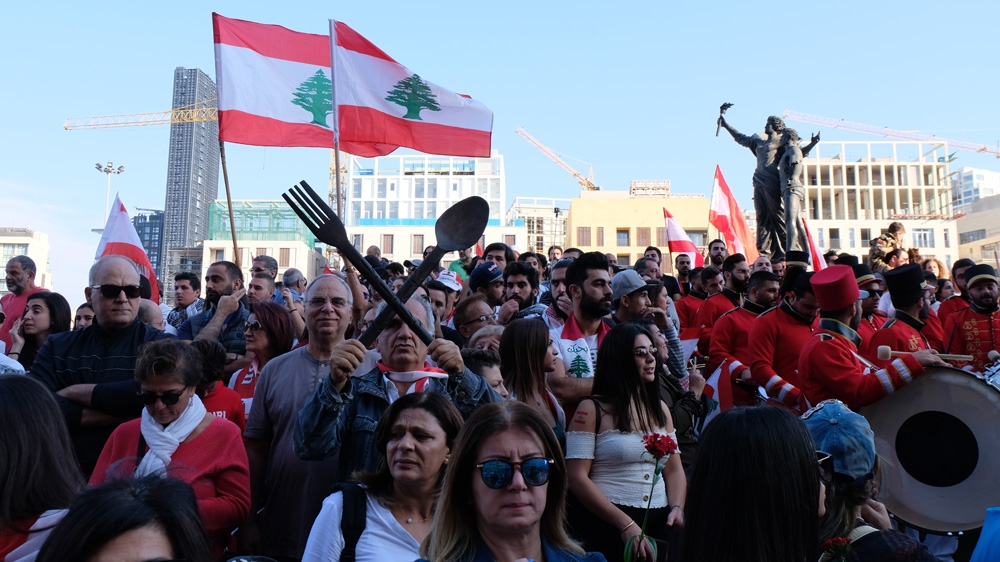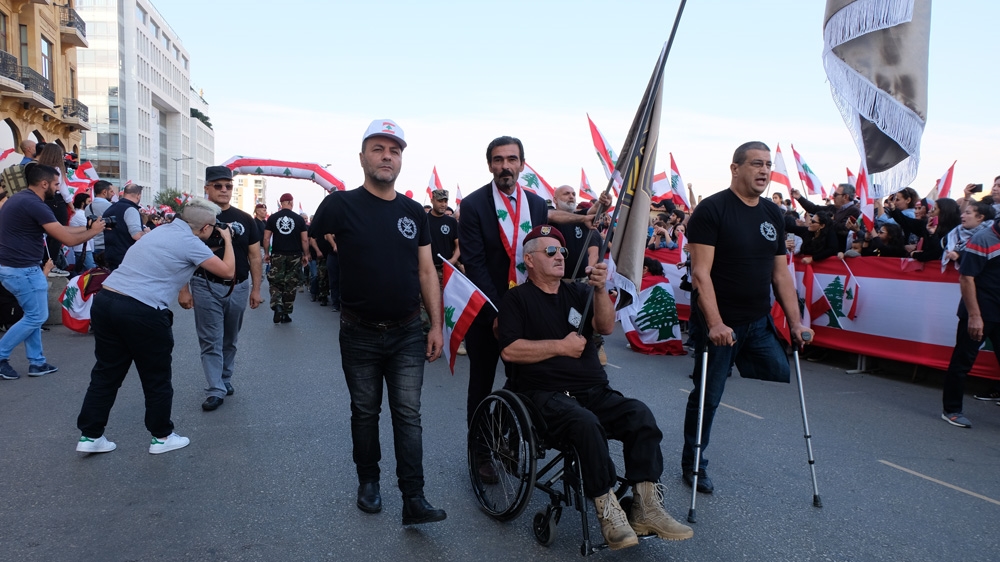Defiant protesters hold rival parade on Lebanon independence day
Separate parades held by politicians and demonstrators, as thousands of civilians march through the centre of Beirut.

Beirut, Lebanon – For the first time in Lebanon’s history, the country marked Independence Day with a civilian march in downtown Beirut, while politicians oversaw a stiff, invite-only military parade at the defence ministry outside the capital.
Last year, politicians had held a large military parade in downtown Beirut, with the participation of the air force and armoured units. Friday’s event, attended by President Michel Aoun, Speaker Nabih Berri and caretaker Prime Minister Saad Hariri, included foot soldiers and lasted about 30 minutes.
Keep reading
list of 3 itemsThe Lebanese revolution must abolish the kafala system
Lebanon needs to free its economy from international lenders
Meanwhile, thousands of people filled Martyrs’ Square for a parade of dozens of civilian “battalions”, sorted by profession and interest, amid a weeks-long popular uprising against the country’s ruling elites.
|
|
“Independence is for the people, not for the politicians or the army,” Samer Abboud, an unemployed 27-year-old told Al Jazeera from Beirut’s Martyr’s Square. “They usually do their parades here and close the road on us. This time we’re closing the road and celebrating the nation.”
The participants showed no opposition to the army – many cars were bedecked with posters of army chief General Joseph Aoun, and protesters clad in military-style outfits waved flags bearing the army seal.
But the separation between the civilian parade and the one for politicians was symbolic of the distance between a ruling class that critics say has become increasingly reclusive and detached as its people revolt for the 37th straight day.
The Lebanese uprising began on October 17, when protesters took to the streets in opposition to proposals for new taxes, but quickly turned into an outspoken movement against Lebanon’s post-war rulers and the country’s political system, where power is apportioned among religious and ethnic groups.
‘Suffer similar issues’
Professionals participating in Friday’s parade said their presence gave added legitimacy to a movement that has already brought down a government.
“It’s important to be here as professionals because each sector has its own demands but at the same time, we suffer from similar issues. The agricultural sector suffers from a lot of corruption, just like many others,” Rana Hasan, a 33-year-old agricultural engineer wearing a straw hat, told Al Jazeera.
Near Hasan, a banner hung on a metal barricade made the point that Lebanon had gained independence from France in 1943, freed itself from Israeli occupation in 2000 and pushed Syria to withdraw in 2005.
On October 17, the day the ongoing protests broke out, Lebanon began gaining its independence from the corrupt, the banner read.

‘Revolution, revolution’
The parade also saw large participation by Lebanese living abroad, hundreds of whom flew in for Independence Day and were ferried by bus straight from the airport to the square.
“This will be the first time I take part in an Independence Day event, because I feel like I have a country for the first time,” a woman told a reporter for local news channel LBCI from onboard a bus. Soon after, the passengers started chanting “revolution, revolution”.
As she readied her kids to participate in the parade, Nadine , a mother of four, said she had not seen her husband in years as he worked abroad to provide for the family. “I hope he comes back so that we can live like a family again,” she told Al Jazeera. “There is hope for the future now, very big hope, because the people have woken up.”
Those in the diaspora also participated in their own way, singing the Lebanese national anthem in Paris, while the Burj Khalifa tower in Dubai was lit up with a Lebanese flag.
Aside from Beirut, protests also took place in towns and cities across the country, including in Rachaya, a location directly tied to Lebanon’s independence. French mandate authorities had imprisoned the country’s leaders in the Rachaya Citadel during a rebellion in 1943. The day of their release, November 22, is celebrated as Independence Day.
In the southern city of Sidon, a man was detained by security forces for holding up a sign criticising the country’s top leaders. Images from the scene shared on social media showed the man, wearing a joker mask on his face, with a sign bearing Aoun, Berri and Hariri’s images that read: “The dinosaurs are extinct, the Phoenicians have left, the French ran away. Why are you still here?”

‘Broken fear’
Friday had begun on an off-note in the capital, when an iconic cut-out of a closed fist with the word “revolution” written on it in Arabic was set alight in Martyrs’ Square. But by evening, as thousands massed in the square, a new, nearly-identical fist was raised in downtown Beirut, with the words “revolution” and “for the nation” written on it. The crowd erupted in cheers.
“We are a people who have broken fear, sectarianism and the parties in power,” Michelle, a 29-year old store manager told Al Jazeera as she marched into Beirut from the northern highway at the head of a procession of thousands of Lebanese who had come from across the country. “When a people come together like this, there is nothing that can stand in their way.”
Maroun Nassif, a former aerospace engineer in the Lebanese army, told Al Jazeera that religious divisions had subsided during the uprising.
“We were at a place where there was a Lebanon for Muslims and one for Christians, but now Lebanon is simply Lebanon,” he said. “The country is being born.”